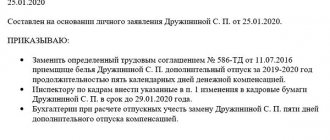The problem of layoffs has become especially pressing in the last few months. The main reason is obvious - a large-scale financial crisis caused by the collapse of prices on the oil market and the coronavirus pandemic. The key task of the current labor legislation is to defend the interests of employees. The article discusses in detail the topic of what an employee is entitled to when being laid off.
Regulatory framework
The list of employee rights upon dismissal due to staff reduction is determined by two basic legislative acts. The first is the Labor Code of the Russian Federation, adopted on December 30, 2001 after the President of the country signed No. 197-FZ. It regulates relations between employees and employers in Russia. The federal law is regularly supplemented and adjusted, so the version dated April 24, 2021 is currently in effect. It takes into account the latest changes, including those related to the coronavirus pandemic.
The second important document is Federal Law No. 1032-1, dated April 19, 1991. It defines the basic principles of state policy in the field of employment of the country's population. Currently, the version of the Federal Law is in force, also adopted on April 24 of this year.
These regulations are supplemented by the provisions of numerous departmental documents adopted by various federal government agencies. Their number is constantly growing, especially rapidly recently, which makes this area of labor legislation one of the most complex.
Basic rights of an employee upon layoff
When answering the question of what rights are guaranteed to an employee upon redundancy, with some degree of convention they can be grouped into several categories. The most important ones are as follows:
- right to advance warning;
- offering alternative options;
- maintaining the order of priority when determining the list of dismissed employees;
- the presence of protected categories of employees;
- payment of compensation provided for dismissal due to reduction of compensation.
Each of the listed rights of an employee who is laid off due to staff reduction in 2021 requires more detailed consideration.
Who has priority rights
In different situations, priorities for laying off workers may be among completely different categories of employees. Selection can be carried out according to the criterion of experience or other subjective criteria. However, there are categories of employees who should be cut last. They, according to Russian law, have more rights in this situation than everyone else. That is why if an employer has to choose between two employees, one of whom is on maternity leave, and the second is on a permanent position, but is a professional, he will have to lay off the latter. The choice cannot always be made rationally, since circumstances may be different.
Priorities when reducing the workforce are regulated by Art. 179 Labor Code of the Russian Federation.
Information and timing of reduction
One of the basic rights of an employee is advance notice of the upcoming reduction and related dismissal. The period for mandatory notification of the employee is 2 months before the relevant decision is made. If we are talking about seasonal workers, they must be notified a week in advance. In addition to the employee, information about planned layoffs is communicated to the local department of the employment service and the trade union of the enterprise's employees, if one has been created. This is one of the employer's responsibilities. The deadlines for providing information established at the legislative level are as follows:
- when reducing less than fifty positions - 1 month;
- if you plan to fire from 50 to 200 people – 2 months;
- for larger reductions – at least 3 months.
Important . The specified two-month period is the minimum. It is allowed to provide information in advance, but no later than this date.
Terms of dismissal in case of reduction
In accordance with the norms of Article 180 of the Labor Code of the Russian Federation, an employee subject to layoff must be notified of this at least 2 months before the fact of dismissal . It follows from this that the two-month period is counted precisely from the date of notification to the employee (in person and against signature), and not from the date of issue of the order.
At the same time, the same article of the Labor Code allows dismissal to be carried out earlier if this was agreed upon by the parties in writing, and the employee received additional compensation in the form of average wages (earnings), calculated for the period of the difference in days between the designated two months and the actual date of dismissal.
In addition, Article 81 of the Labor Code of the Russian Federation directly prohibits the reduction (except in cases of liquidation) of persons on sick leave (temporary disability) or during vacation. Neither the type of leave nor the duration of sick leave is established by law.
There are a number of other exceptions:
- When concluding an employment contract for a period of up to 2 months, dismissal is possible with a warning of at least 3 calendar days - Article 292 of the Labor Code of the Russian Federation.
- For seasonal employment, 7 calendar days are sufficient - Article 296 of the Labor Code of the Russian Federation.
All notifications are made in writing and signed by the interested parties.
Offer an alternative position
Another important responsibility of the employer is to use all possible measures to maintain the employment of employees. One way to minimize layoffs in an organization and respect employee rights is to offer a transfer to another job. In this case, you need to follow three simple rules. Firstly, the proposed vacancy must correspond to the qualifications and physical characteristics of the employee.
Secondly, she can be on staff of any of the employer’s organizations. Thirdly, it is permissible to reduce the employee’s salary level. Despite the last point, such an employee’s right during layoffs at an enterprise should be considered extremely useful. Moreover, if we take into account the voluntary nature of the possible transition.
Sequence of dismissal
An equally important right of an employee when reducing jobs in an organization is the order of dismissal. The employer must keep more qualified employees employed. If we are talking about employees with equal levels of professional training, it is necessary to take into account the productivity of their previous work.
Significant legal nuance. For positions where documentary evidence of qualifications is not possible, the level of knowledge is determined by a specially created commission. It is recommended to include representatives of the trade union in its composition, which will ensure objectivity in decision-making.
Protected categories of employees
The legislation provides certain categories of workers with a preferential right to retain employment in the event of layoffs. Two criteria for their determination - qualifications and productivity - have already been announced. In addition to them, other things being equal, the employer, in the process of making a decision on dismissal, is obliged to keep the following categories of employees employed at the enterprise:
- with two or more dependents;
- the only worker in the family;
- who has become disabled or suffered an occupational disease/injury;
- war veteran;
- undergoing advanced training courses or other types of professional training at the expense of the employer.

The legislation allows for the provision of preferential rights to other categories of employees if this is provided for by the collective agreement in force at the enterprise. Some categories of employees cannot be dismissed due to reduction at all. These include:
- pregnant women;
- mothers raising a young child or a disabled child;
- mothers whose child is under 3 years old;
- sole breadwinners in the family;
- employees who are on vacation or sick leave.
Important . To dismiss a minor employee due to redundancy, it will be necessary to obtain the consent of the relevant commission and labor inspectorate.
Who can't be laid off?
Current legislation, in particular Article 179 of the Labor Code of Russia, identifies a category of citizens who cannot be laid off in the first place:
- women raising 3 or more children;
- employees who are dependent on at least 2 persons;
- citizens who took part in hostilities with the participation of Russia, including disabled people of the Second World War;
- women whose pregnancy is confirmed by an appropriate document;
- workers raising children under 14 years of age alone;
- citizens who are recognized as temporarily disabled;
- employees supporting their entire family alone;
- persons who take advanced training courses;
- workers who are injured while performing their job duties.
It is important to know! The collective agreement or regulations of the organization may identify additional categories of citizens who cannot be reduced in the first place.
When carrying out a reduction, the head of the organization must take into account many factors, including the presence of citizens on the staff who have preferential rights. When choosing which workers will be laid off first, special attention must be paid to the person's skill level. If a dismissed citizen does not agree with the reduction, he can challenge it in court. To do this, you will need to provide evidence of the illegality of the reduction.
Severance pay and additional compensation
If the company's workforce is reduced, the employee has the right to receive severance pay. Its value is the employee’s monthly salary. A seasonal worker is entitled to 2 weeks of earnings. The stated benefit amount is the minimum. The provisions of a collective or individual employment agreement may provide for more significant severance pay.
Another right of an employee dismissed due to job reduction is additional compensation while looking for a new job. It is paid in the amount of the employee’s average monthly earnings. Thus, the total payment amount is two monthly salaries.
Important .
In the event of a layoff at an enterprise, the employee retains all rights granted regardless of the reason for dismissal. These include payment of compensation for unused vacation during the year.
Which categories of workers are the first to be laid off?
When information arises about upcoming changes in the composition and number of jobs, all employees of the enterprise have a question about who will be laid off first when staffing is reduced . This process is not regulated by law, except for the presence of certain categories of employees who have a preferential position or are not subject to layoffs.
In most cases, employers lay off the following employees first:
- working in those departments that are subject to closure;
- those with less qualifications and experience;
- those who came to work at the organization later than others;
- who have penalties or have already been noted for improper performance of duties;
- unwanted for various reasons.
Often, employers use layoffs to achieve their own goals. Highly qualified specialists who are of great importance to the enterprise often end up at the last level on the list of layoffs.
Actions in case of violation of employee rights
Any violations of the above rights of an employee upon dismissal due to staff reduction in the organization in 2021 become the basis for the employee to protect his interests. The standard procedure to take in such a situation is as follows:
- You should first contact the employer directly. Often, violations of the law are unintentional and can be corrected without the intervention of regulatory authorities. Moreover, any attempt to reach an agreement will be an important argument in favor of the employee in further proceedings;
- in the absence of a positive decision, it is necessary to send a complaint to the supervisory authorities. These include the labor inspectorate and the prosecutor's office. The appeal is formalized and must be registered in accordance with the procedure established by law;
- The last option to solve the problem is to file a claim in court. The case is considered by the authority at the place of registration of the employer.
The employee’s actions when forced to resign remain fairly transparent. It is possible to use all three methods simultaneously, but it is advisable to act in the specified sequence. The fact is that in most cases it is quite possible to achieve respect for the rights of an employee during staff reductions without going to the prosecutor's office, the labor inspectorate, and especially to the court. Employers know very well that any visit from supervisory authorities will most likely result in much greater financial losses than the payments provided for by law for employees upon dismissal. For assistance in resolving issues of unlawful dismissal, it is recommended that you contact the appropriate legal organizations.









